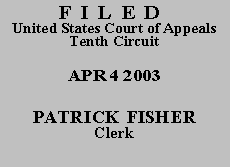

| MARCIANO BRIONES,
Plaintiff-Appellant, v. GALE NORTON, Secretary of the U.S. Department of the Interior, Defendant-Appellee. |
|
Plaintiff Marciano Briones appeals from a judgment of the district court following a bench trial before a magistrate judge. Mr. Briones was represented by counsel during the district court proceedings, but is proceeding pro se on appeal. Mr. Briones, a Hispanic male who was sixty-six at the time of the events in question, filed suit against his employer, the United States Department of the Interior, alleging he was twice not selected for promotion as a result of illegal discrimination under Title VII of the Civil Rights Act of 1964, 42 U.S.C. §§ 2000e to 2000e-17. His final, second amended complaint alleged he was not selected for a management position at the Bureau of Land Management (BLM) in 1998 because of age discrimination and as reprisal for employment discrimination complaints he made between 1989 and 1991. His second amended complaint also alleged he was not selected for a management position at the Fish and Wildlife Service (FWS) in 1998, because of national origin, age, and gender discrimination.
The case was tried to a magistrate judge by consent of the parties. See 28 U.S.C. § 636(c). Mr. Briones testified, as did the six BLM and FWS employees involved in the two job selections at issue. At the conclusion of the trial, the magistrate judge issued a thirty-page decision, with detailed findings of fact and conclusions of law, ruling in favor of the defendant on all counts. The magistrate judge ruled that the individuals involved in the two job selections did not select Mr. Briones for the two positions in question because, after reviewing the candidates' prior experience, knowledge, skills, and abilities, and conducting interviews with the candidates, each concluded Mr. Briones was not the most qualified person for the jobs in question. The magistrate judge further found that no member of either selection panel took into consideration Mr. Briones's age, national origin, sex, or prior employment discrimination complaints in rating the candidates' qualifications or in not selecting Mr. Briones for the position.
On appeal from a bench trial, we review the magistrate judge's "findings of fact for clear error and the court's conclusions of law de novo." EEOC v. Wiltel, Inc., 81 F.3d 1508, 1513 (10th Cir. 1996). Mr. Briones makes a conclusory assertion on appeal that the magistrate judge erred because he was more qualified for the two positions than the candidates selected. There is ample evidence in the record, however, from which a factfinder could conclude that Mr. Briones was not the most qualified candidate for either position. Thus, we conclude that the magistrate judge's findings in this regard are not clearly erroneous. Mr. Briones also alleges collusion between the Department of Interior, the United States Attorneys Office, and the magistrate judge. He presents no evidence in support of this purely speculative assertion, which we find to be without merit.
Mr. Briones also complains the magistrate judge curtailed, eliminated, and overruled relevant facts related to the selection process. He fails to specify what evidence he believes was wrongly curtailed or excluded or to identify where in the record he objected to any ruling by the magistrate judge with respect to any allegedly excluded evidence. Further, from our own review of the record, we are unable to locate any evidentiary rulings by the magistrate judge about which Mr. Briones objected, or instances in which the magistrate judge excluded any evidence Mr. Briones sought to introduce. Thus, we are unable to consider these contentions. See Lopez v. Behles (In re Am. Ready Mix, Inc.), 14 F.3d 1497, 1502 (10th Cir. 1994); see also Fed R. Evid. 103(a)(2); 10th Cir. R. 28.2(C)(3)(a) ("Briefs must cite the precise reference in the record where a required objection was made and ruled on, if the appeal is based on . . . a failure to admit or exclude evidence.").
Mr. Briones generally alleges judicial bias on the part of the magistrate judge, but he complains only about the judge's unfavorable ruling. This is insufficient to demonstrate judicial bias. See Liteky v. United States, 510 U.S. 540, 555 (1994) (holding that adverse rulings at trial may provide grounds for appeal, but they are insufficient alone to show bias).
Finally, Mr. Briones appears to request a jury trial. This claim is also without merit. Mr. Briones never requested a jury trial during the district court proceedings and, indeed, expressly consented to have the magistrate judge conduct all the proceedings, including a bench trial.
The judgment of the United States District Court for the District of Coloradois AFFIRMED.
Entered for the Court
Circuit Judge
*. This order and judgment is not binding precedent, except under the doctrines of law of the case, res judicata, and collateral estoppel. The court generally disfavors the citation of orders and judgments; nevertheless, an order and judgment may be cited under the terms and conditions of 10th Cir. R. 36.3.